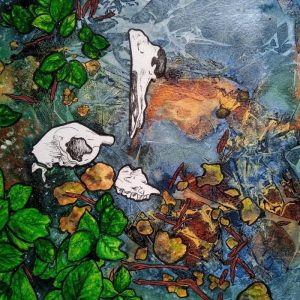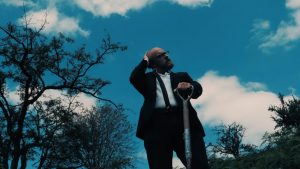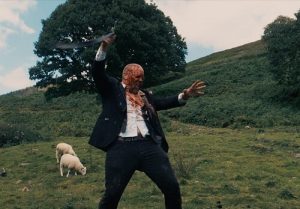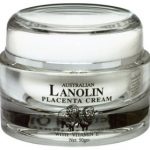Album Review: ‘It Might Be Hot Outside, But The Dirt Is Cold’ – Mahouts (2020)

‘It Might Be Hot Outside, But The Dirt Is Cold’, Mahouts
Words: Jeremy Gluck
Guest Writer (Director, Welsh Connections/SWND Records – Musician – Artist)
“She had emerald eyes and she shaved her head!”
So sings the refrain of ‘Don’t Tell Catherine’ heralding, in initial acoustic glory giving way to metronomic minimal rock, the first album by Mahouts, ‘It Might Be Hot Outside, But the Dirt Is Cold’ – obscure Cwmaman’s big little music miracle.
First question out to bolt the barn: Where (what?) is “Cwmaman” but, look, if you live in Australia, you’re, like, ten thousand miles away or something so – get real! – does it really matter? Can we get to back the album now? Thanks.
Because, wherever it is from (to save time we’ll agree to call that “Wales”) it is terrific. Music like this does not grow on trees, friends, it grows underground, slowly, like the shiny black stuff they ripped Wales apart to raise up and burn, the food-body of the Industrial Revolution that in its strike-ridden death throes turned many communities into living ghost towns. Yes, coal. Anthracite. The black stuff, of dreams and nightmares. Life and death as usual: Mahouts country.
(Right, now it’s “What is a ‘Mahout’?” You’ve heard of Google, get busy, get on the bus, get to where we are, and keep the big, ugly one shut!)

Facts Corner: Following the release of the second Mahouts EP, 2018’s ‘Illuminating Times’, the live band founder Dorian Richard Holmes had put together to promote its predecessor – ‘Vibrant Memories’ EP of 2016 – went their separate ways.
Bandless, once again Holmes went back to Cwmaman and spent some time away from it all. Late in 2019, after resuming solo Mahouts gigs, a collection of songs started to form that were different to what had come before.
Through our enforced lockdown at the start of 2020 Holmes cultivated more songs and ideas in the same vein, relying on stories and in some cases, a percussive, hypnotic approach to get the songs across.
Recorded on a beat-up, slightly fault 4-track Tascam, mostly in the living room of Holmes’ house, no drum kits were used on the album. Says Holmes, “If I told what I used, I’d have to kill you.” (Note to dear Dorian: I’m writing you a rave review, mate, you have to ask yourself: Do you really want to kill me?)
Holmes – even if he writes a killer murder ballad – is in reality a very genial and modest fellow, not obviously tending to homicide, who grew up as a Welsh “Valley Boy”, clearly imprinting him deeply, the impression of which is strong in his abundant creative vision.
“I am indeed a Valley Boy born and raised,” relates Holmes, “I’ve been knocking around in bands for 18 years, everything has been variations on shouting, screaming punk rock. Tastes change, and horizons widen.
“I had been messing around with something with more rhythmical & percussive; I had also been messing around with folkier sounds. This became Mahouts in 2016 – I wanted to be able to throw everything at it and have no real boundary line.
“I grew up in a village close to Aberdare, and now I’m residing in Cwmaman – while it’s not far from Aberdare it can feel like it’s a hundred miles away sometimes. In a good way. And I suppose that type of splendid isolation really informed the album, and its content.
“I grew up and still exist weaved in amongst the stories of people that couldn’t possibly live anywhere else, and in that you have the ‘Goldfish Bowl-effect’ with truth and rumour, where the more it spreads the more distorted it gets. I wanted the songs to feel like that, like maybe you’re not getting the full story – but a version of it.”

In my experience, the valleys are a mashup of beauty, ambiguity and some despair. I asked Mr Mahout if this perception is correct?
“To a certain degree, yes. And to be able to fully appreciate the beauty you have to understand the despair,” he explains.
“There are communities that were ruined in the 1980s that have never really recovered; in that may come a lot of distrust and an almost hereditary racism where you repeat your parents and grandparents viewpoints without any experience of your own.
“But the hope, community and beauty are what’s truly special about the Valleys. You don’t need museums to inform you of your history when the mountains are still forthcoming with their stories.”

I put it to Dorian (first-name terms now, darlings!) ‘Don’t Tell Catherine’ for example, and some other tracks, could be a toxic Traveling Wilburys. Discuss?
“I like ‘Toxic Traveling Wilburys’ simply because I would always hope it doesn’t sound as sterile as them,” Dorian replies.
“There was no real basis or reference point for these songs, but there was a fully formed idea in my head before starting to record them. ‘Catherine’ started on an acoustic guitar; I knew in my head what it was supposed to sound like. I worked until they both matched.
“I suppose I’m lucky enough to be able to play a few instruments and have a good idea with regards to percussion (I think cowbells and woodblocks are almost a Mahouts trademark at this point), to be able to lock myself away and potch.
“And while it’s amazing to be able to get some assistance on the tracks from friends – Paul Underdown features on two of the tracks, he became my right hand man through the recording and will be keeping that title in the live band. It’s also nice sometimes to not pollute the vision.
If I fuck it up, there’s only I to blame.”
To find a musician willing to take any responsibility at all for anything has got to be refreshing! ‘Cold Reservoir Water’ is just one song on the album that is a textbook exercise in DIY, lo-fi, minimalist mastery. What else has brought together this sound and vision?
“I had an idea early on about the album being a collection of stories and events that existed within the same time and place. There are indeed some truth and autobiographical elements within it, but I’m not saying what’s what,” Dorian insists.
“However, the accidental death of a gentleman up the second reservoir in Cwmaman over the summer gave the total inspiration for that song. The preceding rumour-mill and open ponderings about whether it was suicide, murder or accident brought that song out of the ether.
“That was somebody’s son, and maybe we need to all remember that we all give in to gossip, but often, the truth is much sadder. With ‘Cold Reservoir Water’, it was a conscious decision to not clutter the song or the message – I wanted it to be almost like a chant.”
Compulsive for its pulse of inflected Americana, Mahouts’ entrée rejoices in songs as strong as ‘Sometimes I Hear Her Call My Name’, for which Dorian has homemade a remarkably memorable video, filmed in the foothills and bleeding atmosphere worthy of a six-figure MTV head trip.
There is a lot of space and depth in this very natural and budget-starved sound, full of muted but dynamic energies. The palette Dorian uses is by turns monochromatic and technicolour. How do you get that balance?
“With this album, I wanted to make it big but not loud or cluttered; I still wanted to be able to hear the space in between the music and the sound of the room,” he explains.
“Over the years, also, I’ve worked out where the natural sweet spots are at Mahouts HQ. I tend to record vocals, guitars & percussion in the same places before experimenting with the other bits. I suppose I find something quite rewarding about working with a 4-track.”
Rewarding? Rewarding??? You’ve made half a masterpiece with the damn thing, son, and that ain’t no lie. Formed from the heart and soul of Wales, ‘It Might Be Hot Outside, But The Dirt Is Cold’ is the sound of a lost world finding itself from scratch. It’s raw, it hurts, and it’s totally real. Dig it, dig in, keep digging. There’s still gold – maybe, better, coal – in them thar hills…
‘It Might Be Hot Outside, But The Dirt Is Cold’ released 9 October on SWND Records.


